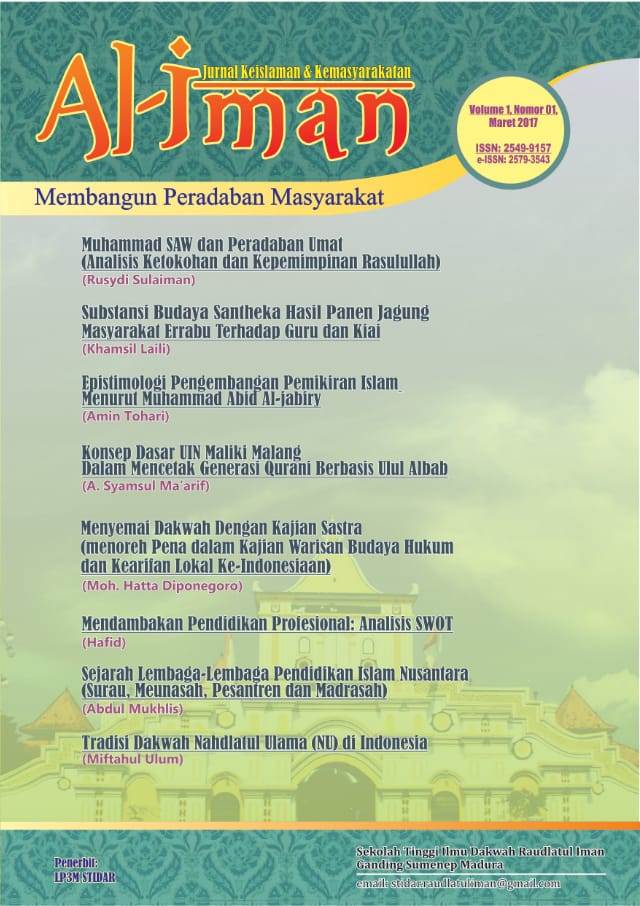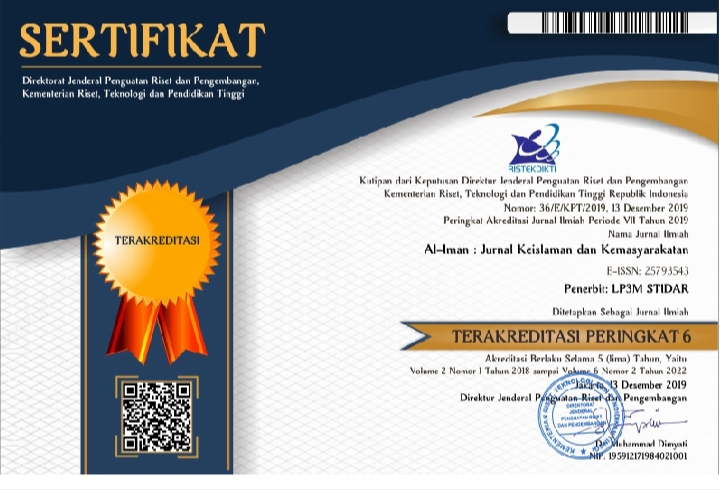Muhammad Saw. dan Peradaban Umat (Analisis Ketokohan dan Kepemimpinan Rasulullah)
Keywords:
Ketokohan, Kepemimpinan, RasulullahAbstract
Muhammad, Saw. adalah tokoh besar yang menggagas sejarah Islam. Nabi yang agung tersebut sangat dikagumi oleh berbagai kalangan, tak terkecuali non-muslim. Siapapun mengakui kebesaran dan keagungan Muhammad, Saw. melebihi ketokohan nabi-nabi lain sebelumnya. Tulisan ini secara spesifik membahas tentang ketokohan dan kepemimpinan Muhammad, Saw. dalam realitas sejarah Islam, merujuk kepada sumber-sumber terkait berupa kitab, buku dan literatur lain. Muhammad Saw. tidak sekedar muballigh (the preecher), tetapi negarawan (the stateman) yang menggetarkan Jazirah Arab bahkan dunia—disebut juga sebagai,â€The spiritual leaderâ€. Muhammad Saw. adalah nabi akhir yang telah mengimplementasikan prinsip kebebasan agama dan toleransi beragam serta koeksistensi sosial sesuai ajaran Islam. Piagam Madinah misalnya merupakan fakta sejarah atas realisasi kebebasan berpikir dan kebebasan agama serta toleransi beragama dalam Islam yang diwariskan oleh Nabi Agung, yaitu Muhammad, Saw. Ide baru tentang sistem pemerintahan dan bentuk-bentuk lembaga politik negara sebagai produk peradaban, selanjutnya terjadi pada periode khalifah empat, disebut “al-Khulafaa’ al-Raasyiduun†yang berlangsung pemerintahanya selama tiga puluh tahun (632-661 M) Muhammad, PBUH. is a great figure who initiated the history of Islam. The great Prophet is greatly admired by various circles, not least non-Muslim. Anyone recognizes the greatness and majesty of Muhammad, PBUH. surpassing the prophecies of other prophets before. This paper specifically discusses the character and leadership of Muhammad, PBUH. in the reality of Islamic history, refers to related sources, such as: kitab, books and other literature. Muhammad, PBUH. Not just muballigh (the preecher), but also the statesman that shakes the Arabian Peninsula even the world-is called, "The spiritual leader". Muhammad, PBUH. is the final prophet who has implemented the principle of religious freedom and tolerance as well as social coexistence according to Islamic teachings. Medina Charter for example is a historical fact on the realization of freedom of thought and freedom of religion and religious tolerance in Islam inherited by the Great Prophet, namely Muhammad, PBUH. The new idea of ​​the system of government and the forms of state political institutions as a product of civilization, subsequent to the period of the four caliphs, is called "al-Khulafaa 'al-Raasyiduun" which lasted for thirty years (632-661 CE)Downloads
Published
Issue
Section
License
Al-Iman: Jurnal Keislaman dan Kemasyarakatan (ISSN : 2549-9157xx) dan (EISSN: 2579-3543xx) diterbitkan oleh Lembaga Pusat Penelitian dan Pengabdian Masyarakat (LP3M) STID Raudlatul Iman (STIDAR) Sekolah Tinggi Ilmu Dakwah Raudlatul Iman Sumenep Madura. Jurnal ini memuat kajian-kajian keislaman yang meliputi Kajian Dakwah, Interaksi sosial. Terbit dua kali setahun, yaitu bulan Maret dan september









